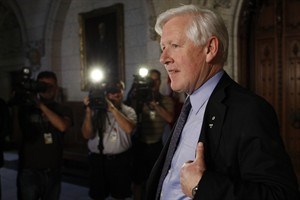
Liberal interim leader Bob Rae speaks to reporters in the foyer of the House of Commons on Parliament Hill in Ottawa on Wednesday, June 13, 2012. Rae announced that he will not be running for the Liberal leadership. THE CANADIAN PRESS/Sean Kilpatrick
June 13, 2012 - 3:43 PM
OTTAWA - Bob Rae, who has spent a lifetime in politics and twice reached for the brass ring of the Liberal leadership, isn't going to stretch for it again.
The 63-year-old politician, a one-time Rhodes Scholar, a former NDP premier of Ontario and an officer of the Order of Canada, will instead remain the avuncular overseer of the leadership campaign as the party's interim leader.
His decision is an uncharacteristically tame one for a man who has lived with an internal political fire for four decades.
Rae was born in Ottawa in August 1948. He was the son of Saul Rae, a legendary diplomat whose career spanned the golden era of Pearsonian diplomacy in which he was twice Canadian ambassador to the United Nations.
Where the elder Rae had been a Massey Fellow at the London School of Economics, the son surpassed him, winning a Rhodes Scholarship to study at Oxford.
He earlier earned a law degree at the University of Toronto where, for a time, he roomed with Michael Ignatieff, another scion of a diplomatic family. The two would later be political rivals for leadership of the Liberal party.
Rae's first foray into politics involved working on Pierre Trudeau's 1968 Liberal leadership campaign. It was a heady time for Canadian politics, with Trudeaumania sweeping the country and galvanizing a generation.
By 1974, Rae had joined the NDP while he worked as a labour lawyer. In 1978, at the age of 30, Rae was elected to the House of Commons as a New Democrat in a byelection.
Re-elected in 1979, it was Rae's amendment to a budget motion which toppled Joe Clark's Conservative government and precipitated the 1980 election which brought Rae's old idol, Trudeau, back to the prime minister's chair.
Rae won re-election in 1980 and seemed content as an MP. He might have stayed in Ottawa but for troubles inside the Ontario NDP, where an internal revolt against then-leader Michael Cassidy led to a movement to bring Rae in as a replacement.
He won the leadership handily, supported by many of the strongest members of the caucus, and won a seat in the legislature in a byelection in November 1982.
In 1985, Rae helped broker an end to four decades of Conservative government in the province. The election that year left the Tories with a plurality of seats, but 11 short of a majority.
Rae and Liberal Leader David Peterson worked out an accord whereby the NDP pledged to support a Liberal government for two years in return for implementation of some NDP policies.
The Tories were quickly defeated in a no-confidence vote and Peterson became premier.
The NDP-Liberal accord held together for two years, although not without friction. In the 1987 election, the Liberals won a landslide. Although Rae almost lost his own seat, he ended up as leader of the Official Opposition, as the Tories were crushed.
Peterson called a snap election in 1990, expecting to win easily. But the campaign came unglued. The premier was seen as an architect of Brian Mulroney's Meech Lake accord, which was deeply unpopular in Ontario.
To the surprise of many, the NDP won the election with a strong majority.
In many ways it was a poisoned cup for the new premier, who took office in October 1990. Economic storm clouds were gathering and the province slipped into recession. The new government ministers had never held office. The party backtracked on several campaign promises and a series of scandals rocked the Rae government.
Spending and the deficit rose as the government tried to fight the recession. In fighting the deficit, Rae introduced a so-called social contract which froze public-sector wages. He instituted so-called "Rae Days" — unpaid days off for teachers, nurses and public servants — which earned the ire of the white-collar unions.
By 1995, the NDP's popularity had evaporated and in the election that year, the Conservatives regained a majority while the NDP fell to third place. Rae resigned in 1996 and returned to the law.
He became an officer of the Order of Canada in 2000 and was appointed chancellor of Wilfrid Laurier University in 2003. He was reportedly twice considered for the post of Governor General.
In 2005, he was commissioned to run a limited inquiry into the Air India tragedy.
But politics beckoned and in April 2006, he joined the Liberal party and announced his candidacy for leadership, saying he had made mistakes, but had learned from them. He found himself running against Ignatieff, his old university roommate. In December, he finished third at the convention which elected Stephane Dion as leader.
Rae returned to the Commons in a byelection in March 2008. He flirted with the Liberal leadership again later that year, after Dion stepped down, but Rae bowed out in favour of Ignatieff.
After the debacle of the 2011 election, which cost Ignatieff his own seat and reduced the Liberals to a third-party remnant, Rae took over the interim leadership.
News from © The Canadian Press, 2012